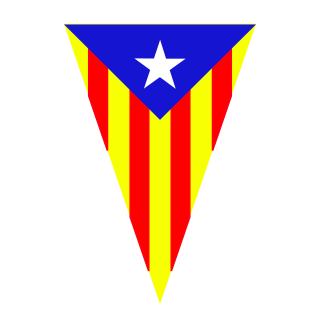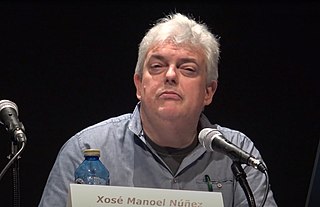
Lluís Companys i Jover was a Catalan politician who served as president of Catalonia from 1934 and during the Spanish Civil War.

The Catalan Countries are those territories where the Catalan language is spoken. They include the Spanish regions of Catalonia, the Balearic Islands, Valencian Community, and parts of Aragon and Murcia (Carche), as well as the Principality of Andorra, the department of Pyrénées-Orientales in France, and the city of Alghero in Sardinia (Italy). It is often used as a sociolinguistic term to describe the cultural-linguistic area where Catalan is spoken. In the context of Catalan nationalism, the term is sometimes used in a more restricted way to refer to just Catalonia, Valencia and the Balearic Islands. The Catalan Countries do not correspond to any present or past political or administrative unit, though most of the area belonged to the Crown of Aragon in the Middle Ages. Parts of Valencia (Spanish) and Catalonia (Occitan) are not Catalan-speaking.

Lluís Domènech i Montaner was a Catalan architect who was very much involved in and influential for the Catalan Modernisme català, the Art Nouveau/Jugendstil movement. He was also a Catalan politician.

Enric Prat de la Riba i Sarrà was a Catalan politician, lawyer and writer. He was a member of the Centre Escolar Catalanista, where one of the earliest definitions of Catalan nationalism was formulated. He became the first President of the Commonwealth of Catalonia on 6 April 1914 and retained this office until his death. He wrote the book and political manifesto La nacionalitat catalana in which greater autonomy to Catalonia was advocated. He died in 1917 and is interred in the Montjuïc Cemetery in Barcelona.

Estat Català is a pro-independence nationalist historical political party of Catalonia (Spain).

Domènec Batet i Mestres was a Spanish military man who became general of the Spanish Army.
Xavier Casals Meseguer is a Spanish historian specialized in the field of the far-right.

Miquel Badia i Capell (1906–1936) was a prominent figure of radical Catalan separatism during the days of the Second Spanish Republic, member of Estat Català and the JERC, Chief of Public Order of the Generalitat of Catalonia. He became known among his followers as Capità Collons'Captain Balls'.
Pilar Benejam i Arguimbau is a Spanish geographer and pedagogue. In 1961 she graduated in teaching from the School of the Balearic Islands. In 1966 she obtained a licentiate in pedagogy, and another in history from the University of Barcelona in 1972. Finally, in 1985, she received a doctorate in pedagogy from the Autonomous University of Barcelona (UAB).
The People's Army of Catalonia was an army created by the Generalitat of Catalonia on 6 December 1936, during the Spanish Civil War. Its existence was more theoretical than real, because the original structure of the popular militias continued to exist despite the efforts of the Generalitat. After the May Days it was dissolved and its structure assumed by the Spanish Republican Army, which definitively militarized the militias of Catalonia and Aragon.

The Catalan coup d'etat was an unsuccessful takeover of power in autonomous Catalonia, planned by the independentist party Estat Català. The conspirators intended to declare the total independence of Catalonia as a state neutral in the Spanish Civil War, and to marginalize all non-aligned political groupings, especially the Anarchists. They counted on party militias and Catalan army and security units, infiltrated by the Estat Català militants. The coup was planned in November, as the plotters assumed that the central Republican government, absorbed by the battle of Madrid, would not be able to take action. The plot failed because of the Anarchist counter-action, which exposed the scheme and some of its leaders. In pre-emptive strike Generalitat services detained a few of the conspirators; the others fled to France. Estat Català was sidelined, while CNT-FAI ensured its dominant position in Catalonia. The attempted coup remains a poorly researched and rather unknown episode; in historiography it is discussed against the background of Catalan fascism.
The Eastern Army, also translated as the Army of the East, was a unit of the Spanish Republican Army that operated in the eastern part of Spain during the Spanish Civil War. Republican forces deployed on the Aragon front of the war initially came under the command structure of the unit. Later in the Civil War, the unit operated in Catalonia, defending the Republican defensive line along the Segre river.

Xosé Manoel Núñez Seixas is a Spanish historian who specializes in nationalism studies, the cultural history of war and violence, and migration studies.
The Catalan People's Army, known by its members as La Casa, was a Catalan nationalist paramilitary group which existed during the 1970s.
Enric Pérez i Farràs was a Catalan military commander.
The Defense Council was a ministry created by the Generalitat de Catalunya on August 2, 1936, and that existed during the first years of the Spanish Civil War to take charge of military matters in Catalonia, despite the fact that defense powers were exclusive to the government of the Republic.

Francisco José Veiga Rodríguez is a Spanish historian, journalist and writer. He is a doctor and professor in the Department of Contemporary History at the Autonomous University of Barcelona (UAB), where he has been a professor since 1983, with a focus on Eastern Europe, the countries of the former Soviet Union, the countries of the Balkan Peninsula and Turkey. He is an author of newspaper articles for El Periódico de Catalunya and El País.

Josep Dencàs i Puigdollers was a Catalan nationalist politician active in the Republican Left of Catalonia.

Bandera Negra or Santa Germandat Catalana was the secret, armed sub-organization of the Estat Català political party, founded on May 3, 1925.

The Unió Catalanista was a Catalanist political group, initially conservative, formed in Barcelona in 1891, from the union of various Catalanist trade unions and associations that came into contact as a result of the resistance against Article 15 of the Civil Code, which they considered to be an attack on Catalan civil law.












